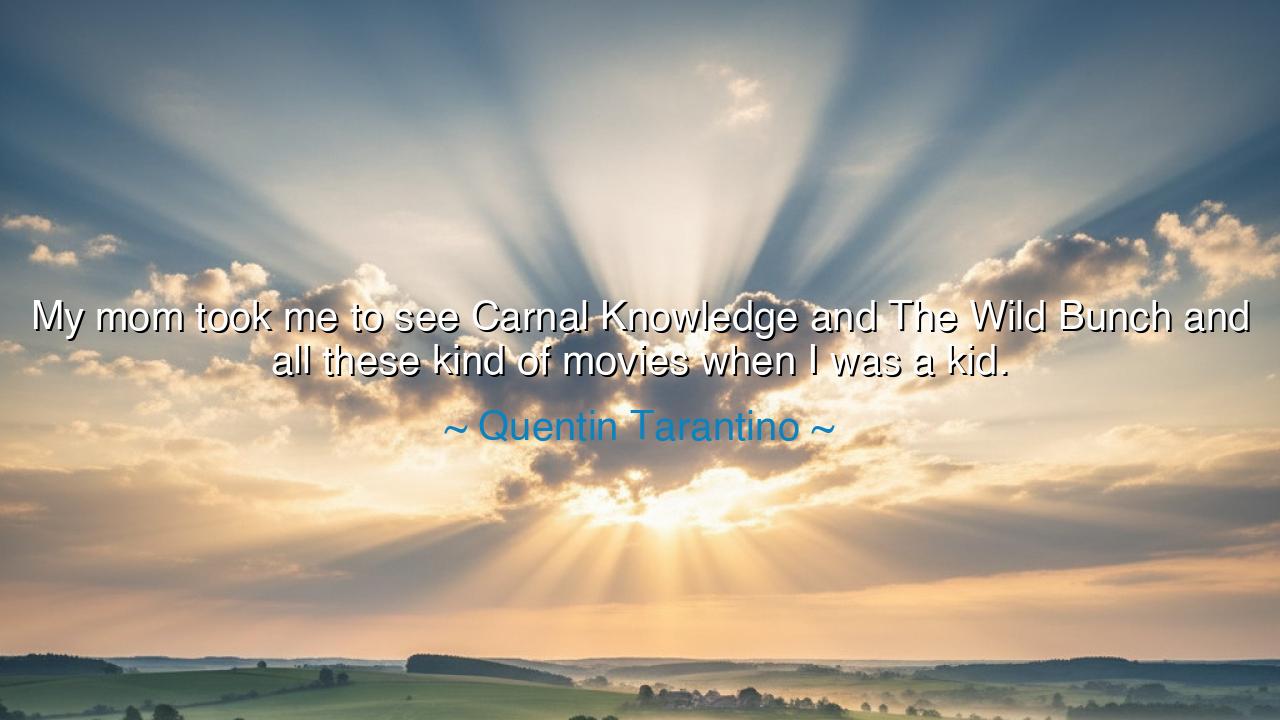
My mom took me to see Carnal Knowledge and The Wild Bunch and all
My mom took me to see Carnal Knowledge and The Wild Bunch and all these kind of movies when I was a kid.






When Quentin Tarantino said, “My mom took me to see Carnal Knowledge and The Wild Bunch and all these kind of movies when I was a kid,” he was not merely sharing a memory — he was revealing the seed of his vision, the moment his soul first encountered the raw power of storytelling. These were not children’s tales he witnessed, but films of violence, complexity, and passion, unfiltered mirrors of the adult world. Through his mother’s daring choice, young Tarantino was initiated early into the mysteries of human emotion — the darkness, the chaos, the beauty of imperfection. In that act, his mother became a kind of priestess of cinema, leading her child into a temple of art not meant for children, but destined for him.
In the ancient traditions, there were always those who believed that wisdom cannot be delayed. Some truths must strike the soul before the mind is ready to explain them. Tarantino’s mother, perhaps without knowing it, followed this ancient instinct. By exposing her son to stories of lust, betrayal, and bloodshed, she taught him not fear, but fascination — the courage to look at life in its fullness, without censorship or shame. From that crucible of images, the young boy learned to see humanity as it is: flawed yet magnificent, sinful yet soulful. That is why Tarantino’s films, though often violent, pulse with life — for they are the creations of a man who learned early that art is truth unhidden.
Consider the story of Alexander the Great, who, as a child, was tutored by Aristotle. The great philosopher did not shield the young prince from the complexities of thought — he gave him Homer’s Iliad, with all its blood and glory, its flawed heroes and tragic ends. Through such tales, Alexander learned not only strategy but the psychology of human desire — the forces that drive men to love, to fight, to dream. Just as Aristotle gave Alexander the world through story, Tarantino’s mother gave her son the same — not in scrolls, but on film. The classroom was a movie theater; the scripture, the silver screen.
The movies he names — Carnal Knowledge, The Wild Bunch — were not polite fables. They were revolutions in art, breaking rules, defying comfort. Carnal Knowledge revealed the wounds of desire, the emptiness that hides behind love. The Wild Bunch painted violence not as spectacle, but as tragedy. These films were truths clothed in chaos, the very kind of storytelling that would later define Tarantino’s art. He did not learn morality from them — he learned perspective. He learned that no one is purely hero or villain, that in every soul burns a mixture of light and shadow. The child who absorbs such lessons grows not into innocence, but into wisdom.
Yet there is also a deeper tenderness in this quote — the bond between mother and son. For it was she, a single mother, who saw that her child was different — restless, hungry for stories. Where others might have protected, she trusted. She let him explore the world through art, believing that understanding the dark makes the light shine brighter. In this, she acted as all great teachers do: guiding the soul without caging it. Her courage gave him permission to create without fear, to tell stories as wild and unrestrained as life itself.
In truth, the ancients would call such a parent a guardian of destiny. For every genius is shaped not only by talent, but by the courage of someone who allows their curiosity to bloom. Tarantino’s mother, by breaking convention, gave him the most precious gift — authenticity. From her he learned that art must never be diluted to comfort the timid. The world does not need safer stories; it needs truer ones. And thus, from the theaters of his childhood rose one of cinema’s boldest voices — a man unafraid to make beauty out of blood, laughter out of pain, and redemption out of chaos.
The lesson for us, dear listener, is this: do not shield the young from truth, but teach them how to see it. The world will always be filled with darkness — it is better to face it through art than through ignorance. Let your children read the hard stories, watch the brave films, and encounter the unvarnished face of life — not to corrupt them, but to awaken their empathy and imagination. For those who see the whole of humanity early learn to love it more deeply.
So remember the wisdom hidden in Tarantino’s words: that sometimes, the path to greatness begins not in comfort, but in confrontation with reality. As his mother once led him into the theater, so too must we lead our hearts into the truth — unflinching, fearless, and alive. For art, like life, is not meant to be safe. It is meant to be real. And those who dare to look upon the real with open eyes become the storytellers of the world.






AAdministratorAdministrator
Welcome, honored guests. Please leave a comment, we will respond soon